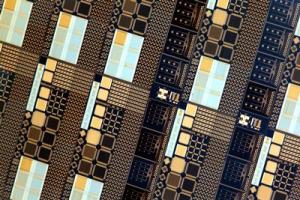
Scientists have discovered a new memristor, a simpler and smaller alternative to transistor, that is four times more powerful and revolutionize the way future electronics will be built.
Researchers at the University of Southampton have found a new memristor that can store up to 128 discernible memory states per switch, almost four times more than previously reported. It can enhance capabilities of nanotechnology opening the door to a new generation of electronics.
In a study published in the journal Scientific Reports, researchers described how several configurations of functional oxide materials which are key for the memristor to alter its resistance. This is different from the traditional way where the processing of data in electronics is based on integrated circuits (chips) featuring huge numbers of transistors or microscopic switches that control the flow of electrical current by turning it on or off.
As transistors have become miniaturized reaching their physical limit, especially in smartphones where an average of five billion transistors require to be fitted, the new memristor technology would come out the real winner for the future needs, said researchers.
Memristors could hold the key to a new era in electronics since they are smaller and simpler than transistors, requiring less energy, and possessing the ability to retain data by 'remembering' the amount of charge that has passed through them -- potentially resulting in computers that switch on and off instantly and never forget.
"Memristors are a key enabling technology for next-generation chips, which need to be highly reconfigurable yet affordable, scalable and energy-efficient," said Themis Prodromakis, Professor of Nanotechnology and EPSRC Fellow at the University of Southampton.
The new age memristor has potentially enormous implications for modern electronics and by 2020, when more than 200 billion interconnected devices will be there within the Internet of Things framework, the new age memristors can handle the incredible amount of data that will need processing, said Prodromakis.
"We are thrilled to be working with world-leading industry, bringing innovations into new electronic systems that require bespoke customization. Such examples include systems that are employed in inaccessible environments; for example, inside the human body, space or other remote or harsh locations. At the same time this technology is ideal for developing novel hardware that can learn and adapt autonomously, much like the human brain," he noted.
Professor Prodromakis and his team will be showcasing the technology, and presenting seven original research papers, at ISCAS 2018, an international circuits and systems conference, in Florence, Italy, in May.









